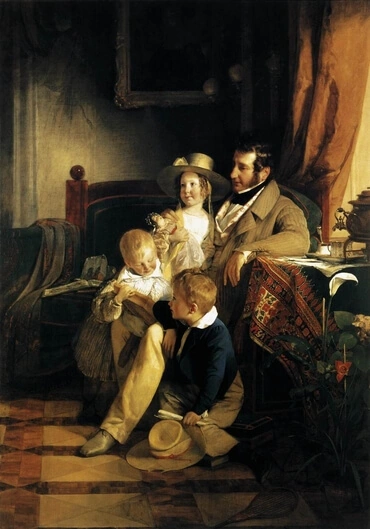17
Datapuwa't kung ayaw ninyo kaming pakinggan, na kayo'y mangatuli; ay dadalhin nga namin ang aming anak na babae at kami ay yayaon.
17
Datapuwa't kung ayaw ninyo kaming pakinggan, na kayo'y mangatuli; ay dadalhin nga namin ang aming anak na babae at kami ay yayaon.

Father in the Word means what is most interior, and in those things that are following the Lord's order, it means what is good. In the highest sense Father means the Lord Himself, the creator. In the generation of natural children it is the father who provides the soul or the most interior receptacle of life, and an internal heredity, and the mother who provides all of the substance that the soul uses to form its body, plus an external heredity. In this process the soul comes from the Lord through the father, and not from the father, since all life is from the Lord. The wise person calls the Lord his father and the church his mother because his interior loves come from the Lord, but are given form and actuality through the truths taught by the church. Those things thus brought forth are a person's spiritual "children". In the New Testament, when speaking of Jesus and the Father, what is meant is the outward manifestation with the divine itself as the soul inside. Because Jesus was born from a natural mother, He had a natural body and a natural Jewish heredity. Throughout his life as He was tempted by the hells, He slowly put off all he had from His mother and replaced it with what He had from Himself inside, the Father. In doing this he made himself one with the Father that was His inmost so He could truly say, "I and my Father are one".
4516. 'You have brought trouble on me, by making me stink to the inhabitant of the land' means that those who belonged to the Ancient Church abominated them. This is clear from the meaning of 'bringing trouble on me, by making me stink' as causing them to abominate, and from the meaning of 'the inhabitant of the land' here as those who belonged to the Ancient Church. For 'the land' means the Church, 566, 662, 1066, 1067, 1262, 1733, 1850, 2117, 2118 (end), 2928, 3355, 4447, and so 'the inhabitant of the land' those who belong to the Church, which in this case is the Ancient Church since that Church continued to exist among some nations in the land of Canaan. But that which was a representative of the Church was not established among the people descended from Jacob until that Ancient Church had completely come to an end. This fact is also meant by those descended from Jacob not being allowed into the land of Canaan until the iniquity of the inhabitants of the land had come to a close, as stated in Genesis 15:16. For no new Church is ever established until the previous one has been laid waste.